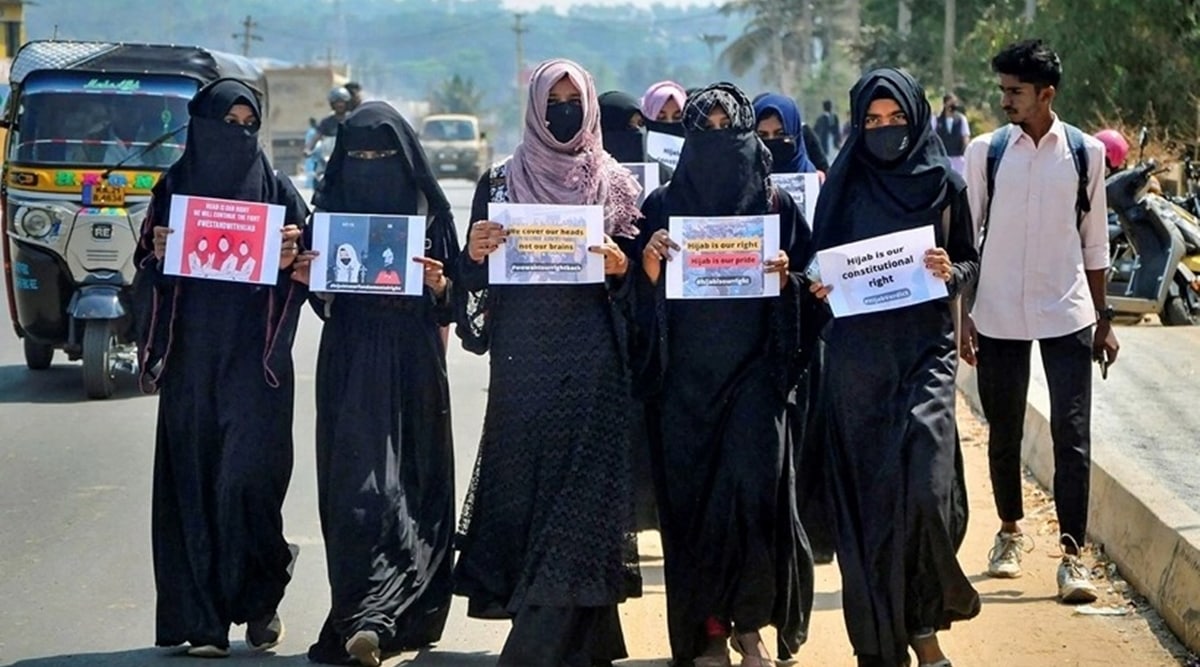Public Debate Ignites Over Macron Party's Proposed Hijab Ban For Minors

Table of Contents
Arguments in Favor of the Proposed Hijab Ban
Proponents of the hijab ban for minors in France base their arguments on two primary pillars: the protection of minors and the upholding of secular values.
Protection of Minors
A central argument revolves around the perceived vulnerability of minors. Supporters contend that children lack the maturity to make fully informed decisions about religious attire, suggesting that wearing a hijab at a young age might be influenced by family pressure or societal expectations rather than genuine personal conviction.
- Concerns about Coercion: Proponents express serious concerns about the potential for coercion by families or religious groups, arguing that a ban protects children from undue influence and ensures their ability to freely choose their religious expression later in life.
- Safeguarding Against Radicalization: Some proponents link the hijab ban to broader concerns about radicalization, arguing that it can be a symbol of religious extremism in certain contexts. While this is a highly contested point, it forms part of the rationale for the proposed legislation.
- Children's Best Interests: Statements from supporters emphasize the paramount importance of prioritizing the best interests of the child, arguing that a ban safeguards their well-being and allows them to develop without the pressure of adhering to religious norms before they are capable of making such choices independently.
Upholding Secular Values
The proposed ban is strongly linked to the principle of laïcité, the French concept of secularism, which emphasizes the separation of religion from the state. Supporters argue that the hijab, in a public setting, contradicts this fundamental principle.
- State Neutrality: The argument is made that the state should remain neutral in matters of religion, and the visible display of religious symbols in public spaces, such as schools, undermines this neutrality.
- Social Divisions: Proponents worry that the wearing of the hijab, particularly by minors, can contribute to social divisions and hinder the integration of Muslim communities into broader French society.
- Secular Public Space: Supporters emphasize the need to preserve a secular public space where individuals are not identified or pressured by religious affiliations, ensuring equality and preventing the marginalization of those who do not adhere to specific religious practices.
Arguments Against the Proposed Hijab Ban
Opponents of the ban raise strong objections based on religious freedom and practical concerns about its implementation.
Infringement on Religious Freedom
Critics argue that the proposed ban represents a severe infringement on fundamental human rights, specifically the freedom of religion guaranteed under international law.
- Discrimination Against Muslim Girls: The ban is viewed as discriminatory, targeting Muslim girls and women specifically and potentially exacerbating existing prejudices and marginalization within French society.
- Religious Diversity: Opponents stress the importance of respecting religious diversity and the rights of individuals to practice their faith freely, without undue state interference. They argue that a ban fosters an environment of intolerance and undermines the principles of a multicultural society.
- Human Rights Violations: Human rights organizations have voiced concerns, stating that such a ban violates international human rights standards and sets a dangerous precedent for restricting religious expression.
Practical Challenges and Ineffectiveness
Beyond ethical concerns, many question the practicality and effectiveness of such a ban.
- Enforcement Difficulties: Enforcing a ban on the hijab for minors would present significant practical challenges, potentially requiring extensive surveillance and intervention in families' private lives.
- Driving the Practice Underground: Critics argue that rather than eliminating the practice, a ban would likely drive it underground, making monitoring even more difficult and potentially fostering resentment.
- Further Marginalization: The ban is seen as having the potential to further marginalize the Muslim community in France, leading to increased social tensions and hindering efforts towards integration.
The Broader Political Context
The proposed hijab ban is not simply a legal issue; it's deeply intertwined with French politics and societal divisions.
Macron's Political Strategy
Analyzing the political motivations behind the proposal is crucial. Some suggest it’s part of a broader strategy to appeal to a specific segment of the electorate concerned about secularism and immigration.
- Electoral Calculations: The proposal’s impact on Macron’s approval ratings and electoral prospects is subject to considerable debate. It could potentially garner support from certain voters, but it may also alienate others.
- Addressing Extremism: While not explicitly stated, the proposal’s proponents may see it as a way to address concerns about religious extremism, even if indirectly.
- Political Commentary: Political commentators offer diverse interpretations, some viewing the proposal as a strategic move to consolidate a particular voter base, while others critique it as divisive and counterproductive.
Public Opinion and Social Divisions
Public opinion on the hijab ban is divided, reflecting the deep societal fissures on this issue.
- Public Opinion Polls: Data on public opinion polls reveal a range of viewpoints, with some supporting the ban and others strongly opposing it.
- Diverse Muslim Views: It’s important to acknowledge the diverse viewpoints within the Muslim community itself, with some supporting the ban while others strongly oppose it.
- Social Cohesion: The debate significantly impacts social cohesion in France, potentially deepening existing divisions and hindering efforts towards national unity.
Conclusion
The proposed hijab ban for minors in France has sparked a passionate and complex debate, pitting concerns about the protection of minors and upholding secular values against arguments about religious freedom and the potential for increased social division. The proposal’s potential impact on French society and the political landscape remains to be seen, raising serious questions about the balance between individual liberties and societal norms.
The debate surrounding the proposed hijab ban continues to evolve. Stay informed about the latest developments and engage in respectful discussions about this crucial issue affecting religious freedom and secularism in France. Further research on the hijab ban in France and its implications is encouraged.

Featured Posts
-
 Crooks Office365 Hack Nets Millions Federal Investigation Reveals
May 25, 2025
Crooks Office365 Hack Nets Millions Federal Investigation Reveals
May 25, 2025 -
 Michael Schumacher A Controversial Figure In Formula 1
May 25, 2025
Michael Schumacher A Controversial Figure In Formula 1
May 25, 2025 -
 Live Pedestrian Struck By Vehicle On Princess Road Emergency Response
May 25, 2025
Live Pedestrian Struck By Vehicle On Princess Road Emergency Response
May 25, 2025 -
 China Zheng Reaches Italian Open Last 16
May 25, 2025
China Zheng Reaches Italian Open Last 16
May 25, 2025 -
 Millions Stolen Inside Job On Executive Office365 Accounts
May 25, 2025
Millions Stolen Inside Job On Executive Office365 Accounts
May 25, 2025
